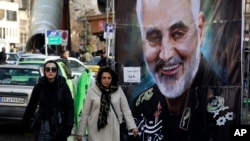Washington is "prepared to react" if Tehran launches an attack to mark the first anniversary of the killing of powerful Iranian General Qasem Soleimani, the head of US forces in the Middle East warned Sunday.
"We are prepared to defend ourselves, our friends and partners in the region, and we're prepared to react if necessary," General Kenneth McKenzie, who heads the U.S. Central Command (Centcom), told journalists.
He was touring the region weeks before the anniversary of the January 3, 2020, killing of Soleimani by a U.S. drone strike near the Baghdad airport.
"My assessment is we are in a very good position and we'll be prepared for anything the Iranians or their proxies acting for them might choose to do," McKenzie, a four-star marine general, told a small group of journalists in a telephone interview from an undisclosed location in the region.
The Centcom commander said he had recently visited Baghdad, where he met with the head of the anti-jihadist coalition, American General Paul Calvert, as well as the Iraqi army chief of staff, General Abdul Amir Yarallah.
McKenzie said he had also gone to Syria to meet with American forces deployed in the small southern base at Al-Tanf, near the border with Jordan and Iraq.
In an apparent sign of U.S. military leaders' concerns about Iranian intentions after Soleimani's killing, McKenzie's current tour was not announced in advance.
Similarly, last week's visits by General Mark Milley, the chairman of the U.S. Joint Chiefs of Staff, to Qatar, Saudi Arabia, the United Arab Emirates, Israel and Afghanistan were kept secret until he had left the region.
"I talk to my commanders about it every day and I think we will be ready," McKenzie said.
Even as the U.S. Army continues troop withdrawals from Iraq and Afghanistan ordered by President Donald Trump -- with a goal of drawing down to 2,500 in each country by January 15 -- the Pentagon has substantially reinforced its posture around Iraq to dissuade Iran from launching any attack.
The aircraft carrier USS Nimitz has been patrolling Gulf waters since late November, and two American B-52 bombers recently overflew the region in a demonstration of strength clearly aimed at Iran and its allies.
Still, a volley of rockets exploded Sunday near the U.S. embassy in Baghdad, causing material damage but no casualties, according to Iraqi security forces.
It was the third attack on American military and diplomatic installations there since an indefinite truce was agreed with pro-Iranian groups in October.





